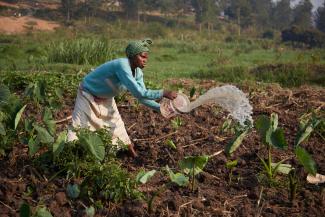Overview global food security
How to end world hunger

In past decades, the international community has always produced enough food to feed everyone. Nonetheless, more than 10 % of the world population do not get what they need, and the scenario has been getting worse in recent years. Covid-19 lockdowns, Russia’s attack on Ukraine and financial speculation are contributing to this trend, and so is the climate crisis, as extreme weather is all too often wiping out harvests. Long-standing issues, moreover, include that rural infrastructure is weak and smallholder farms are largely neglected by policymakers. While there still is enough food for everyone in theory, masses of people simply cannot afford to buy what they need.
The Global Hunger Index
The downward trend is evident in the Global Hunger Index. It is compiled every year by Welthungerhilfe and Concern International, two international NGOs based in Germany and Ireland respectively. This year’s issue was launched in mid-October. Mathias Mogge, the director-general of Welthungerhilfe, warns that large-scale agriculture as is practiced in high-income nations is often environmentally unsustainable. On the other hand, smallholder farmers’ productivity must rise. Masses of them are very poor. He shared core insights with me in an interview for D+C/E+Z.
The full truth is that world hunger does not result from insufficient global supply. Apart from war-torn areas, were the distribution of goods is often impossible, the big problem is unaffordability. Too many poor people simply cannot buy the agricultural products they desperately need. Even in prosperous nations, an increasing number of people depend on food banks.
Food security improves with social safety nets, and speculation can prove harmful
As Svenja Schulze, Germany’s federal minister for economic cooperation and development, argues, stronger social-protection systems would make a difference. In view of the multiple crises we are facing, such systems should be established and expanded fast. Among other things, her essay spells out how rural development in particular can benefit.
As a general rule, markets are better at distributing goods than governments. However, speculation with commodities sometimes exacerbate shocks. Francisco Mari of the Protestant non-governmental organisation Bread for the World elaborated how this played out in the current emergency, worsening need in many places.
It cannot be overemphasised that women and girl are more likely to suffer food insecurity than their male relatives. This is profoundly unjust, not least because women often do most of the farm work. Radio journalist Mireille Kanyange tackled the matter on our pages, using the example of Burundi.
How agricultural innovation depends on age-old rural traditions
Traditional farming is more important than most people assume. Smallholder communities in remote areas of developing countries and emerging markets are safeguarding genetic and other vital resources which global food security depends on, not least because the breeders of high-yielding varieties use them. Without these resources, the international community will not stay able to, at least in principle, produce enough grains, vegetables and fruit. World hunger would then no longer be mostly an issue of dysfunctional distribution, but one of too little supply.
As an officer of the UN Food and Agriculture Organization (FAO), Parviz Koohafkan specialised in agricultural heritage systems for decades. In 2002, he launched its GIAHS programme. The acronym stands for “globally important agricultural heritage systems”. His D+C/E+Z contribution explains why the programme matters.
Rural communities’ traditional knowledge is essential, but so is innovation. To better link the two, agricultural research must pay more attention to the specific needs of smallholder farmers and the environmental contexts they work in. The implication is that more attention must be paid to people living in rural regions of developing countries. Hildegard Lingnau of the Global Forum on Agricultural Research and Innovation (GFAR), which coordinates hundreds of agencies internationally, shared her views in an interview with my colleague Jörg Döbereiner.
Why genetically modified crops matter less than some pretend
Many people, however, still believe that innovation is predominantly a high-tech issue. That is a fallacy. Our Ugandan correspondent Ronald Ssegujja Ssekandi reported why his country’s lack of a GMO law is not a big problem in terms of food security.
Poverty and need affect not only low income countries, but are often quite severe even in rising economic powers. Indeed, food security has been deteriorating in India. Around the world, moreover, many people consume too much fat, sugar and salt. Healthier diets would make sense. Our correspondent Roli Mahajan discussed the matter and also spelled out how eco-friendly innovations based on rural traditions can make a difference in India.
World hunger exacerbated by climate impacts
To achieve SDG2, the end of hunger, action to mitigate the climate crisis is urgent. Last year, the example of Pakistan’s floods shows how extreme weather compounds pre-existing problems. At one point, a third of the country was under water, and 44 % of the people suffered food insecurity. Imran Mukhtar, an Islamabad-based journalist, assessed a very difficut situation.
Spectacular disasters make international headlines. By contrast, smaller calamities, that affect fewer people, are often not taken note of by the international public. Their fate matters too. Ugandan flooding, for example, negatively affected about 90 000 persons in 2022, as Ronals Ssegujja Ssekandi wrote.
The conclusions of the contributions listed on this page are summarised in the edito I wrote for the November issue of our Digital Monthly, which included a focus section on how to end hunger.
It bears repetition. If the international community musters the political will, SDG2 is achievable.
Hans Dembowski is the editor in chief of D+C Development and cooperation / E+Z Entwicklung und Zusammenarbeit.
euz.editor@dandc.eu







